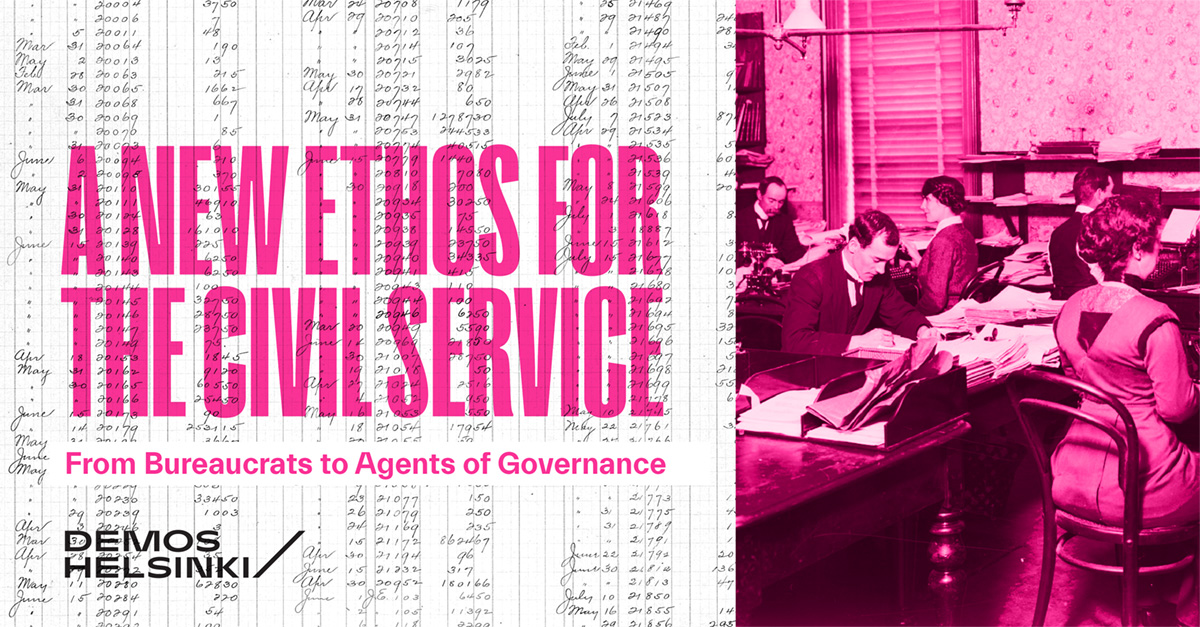Demos Helsinki calls on all civil servants and their leaders to build a new ethos for the civil service.
What are the most appropriate institutional arrangements for effective governance? How can governance systems effectively operate across different levels, such as local, regional, national, and supranational? How can governments improve their capacity to evaluate policies, learn from successes and failures, and adapt to changing circumstances?
In answering these questions, most of the debate focuses on creating new processes within government. It's easy to think of government as an amorphous, soulless mass: at its best, it is an efficient machine; at its worst, a tool for tyrants. Too many well-meaning theories seem to forget the agency of each government's people: civil servants. But civil servants are neither a machine nor a tool. We need to reappraise and support them. By transforming the civil service, we can answer the questions above.
Transformation goes beyond reform: this effort is not about processes but people. Our publication "A new ethos for the civil service: From bureaucrats to agents of governance" features:
- a case for transforming the civil service,
- a suggestion of what a new ethos could look like based on our 15-year experience and worldwide research,
- case studies from an emerging ethos around the world,
- thoughts from civil servants themselves,
- recommendations for how to move forward.

Civil servants as agents of governance
In the absence of faith in politics, civil servants enjoy high levels of trust from the public (Smith, 2018). Yet, the plethora of proposals for civil service reform reflect an image of them as bureaucrats — project managers at best — as if they're meant to carry out mundane tasks defined by precise legal boundaries and well-established courses of action.
Not only is this image distant from the everyday reality of government: it neglects the significance of civil servants' societal role and moral agency (Zacka, 2022). Civil servants participate in policymaking, make substantive judgments and manage multi-stakeholder relationships (Lipsky, 1983). Civil servants are already agents of governance. We need them to be good ones (see, e.g., Carpenter, 2001).
Trustworthy and effective public institutions depend on the ethos they instil in their agents. Developing a new ethos for a 21st-century civil service may be the key to accomplishing more ambitious plans, faster, and with great integrity.
The case for transformation
To address the problems that define our century, we must complement the stability of industrial-era governance (our present structures) with new values that can help us navigate change.
At least four features of industrial-era governance act as potential barriers to societal transformation: a rule-based mindset, short-termism, incrementalism and vertical responsibility. We are not suggesting that these are demolished. Instead, by infusing them with new values and skills, we can build a civil service that is fit for purpose. These values have been emerging all around the world.

Rule-based mindset + humility
A rule-based mindset means civil servants adhere to pre-determined procedures, ensuring stability and impartiality. A side-effect is that it compresses room for administrative discretion in favour of conformity. What would the civil service look like if a rule-based mindset was infused with the capability to revise assumptions and ensure iterative learning through experimentation?
Read more about this in the publication + a case study from Canada.

Short-term accountability + wisdom
Civil servants typically work within institutional environments prioritising short-term or crisis-induced needs over long-term issues. But are we fulfilling our societal potential if they are limited to reacting to shocks? Wise civil servants are well-equipped to devise future-proof processes and foresee alternative futures while preparing to deal with them.
Read more about this in the publication + a case study from Singapore.

Incremental decision-making + imagination
Civil servants are constantly exposed to narrowing their discretion to embrace incrementalism: a decision-making approach that develops solutions out of the current situation. Incrementalism, while useful, can make it challenging to explore new ways to solve problems. Imaginative civil servants have the leadership capabilities that help us rethink how government operations should be envisioned and organised.
Read more about this in the publication + a case study from Finland.

Vertical responsibility + collaboration
Siloes in government present a precise mechanism for allocating responsibility. But they also predetermine how civil servants frame, address, and implement measures. As we ask civil servants to deal with challenges as daunting as the climate crisis, we should also be able to find ways to enhance rather than prevent their collaborative capacities. What does a genuinely collaborative civil service look like?
Read more about this in the publication + a case study from the Netherlands.
Recommendations
Civil servants worldwide are coming up with new solutions: they are looking for new compromises between the need for stability and transformation. We believe that the mission of public sector innovation practitioners, scholars, advocates and promoters — both within and outside of government — should be to catch up with these pioneers and leverage their insights, successes, failures, and lessons to determine how to build a 21st century-fit civil service.
If you head a ministerial department, public agency, or school of administration, or can engage with them, here’s how doing so might look like in practice:
1. Scout forerunners and co-create a bold vision for the ethos of your civil service
- Identify what is happening in your organisation: what talent and skills go unnoticed?
- Engage in co-creation to collectively define the organisation's purpose
- Publish a co-created vision
2. Set the stage for real-life experimentation and spread the learnings
- Launch small pilots that affect the key activities
- Draft a review plan
- Codify insights
3. Consolidate, institutionalise, and codify best practices
- Adopt changes through new career development paths and incentives
- Share your journey with others in the civil service and beyond
- Ensure that the most significant changes are codified within the statute of the organisation
Today, civil servants have a unique opportunity to step up and recognise their role as stewards of our collective future. Yet, transformative civil service can only develop with a parallel transformation in how our societies appreciate and invest in the values that civil servants have already begun to embody and provide us with: humility, wisdom, imagination and collaboration. By recognising, seizing and expanding the scope and ambition of this new ethos, we can nurture a 21st-century-fit civil service: one for ushering us through the urgent and essential transformations ahead.
Lead Author

Work with us
We have been working with governments and civil servants around the world to help build the capacities for a 21 century civil service that is able to navigate the greatest challenges of our time. Recent examples of our collaborations:
Let's connect

Mikael Sokero,
Senior Expert
Mikael works in our governance team and leads our capacity-building efforts, working with civil servants, governments and organisations, including crafting and facilitation tailor-made training for civil servants, both experts and senior executives.
mikael.sokero@demoshelsinki.fi
+358 40 164 6453

Mikko Annala, Team Lead, Transformative Governance
Mikko and the governance team collaborate with governments to think and act beyond the constraints of the industrial era, helping to prepare governments to meet the challenges and seize the opportunities of the 21st century.
If you want to talk through your ideas or co-create something together, get in touch.
mikko.annala@demoshelsinki.fi
+358 40 778 6062
Sources in this text
- Smith, B. (2018). Trust in civil service grows fastest among top professions. Available at: https://www.civilserviceworld.com/professions/article/trust-in-civil-service-grows-fastest-among-top-professions
- Zacka, B. (2022). Political theory rediscovers Public Administration. Annual Review of Political Science, 25: 21-42.
- Lipsky, M. (1983). Street-Level Bureaucracy: The Dilemmas of the Individual in Public Service. Russell Sage Foundation.
- See, e.g., Carpenter, J. (2001). The forging of bureaucratic autonomy. Princeton, NJ: Princeton Univ. Press

